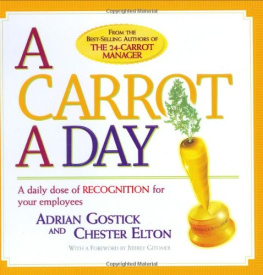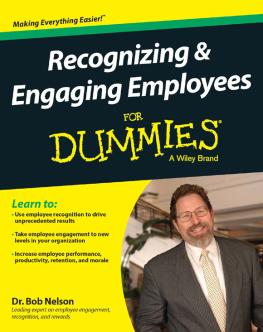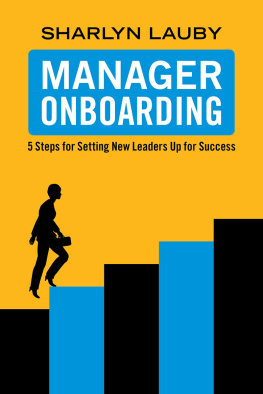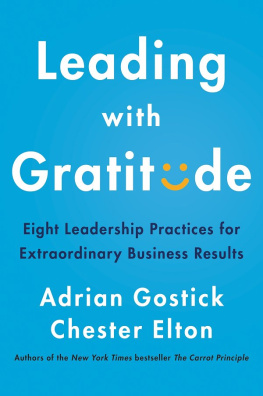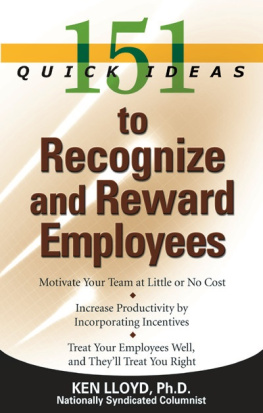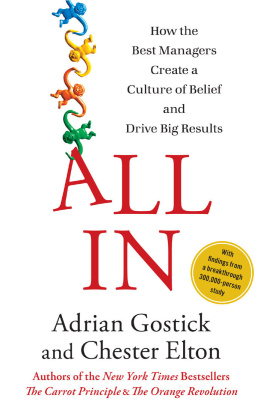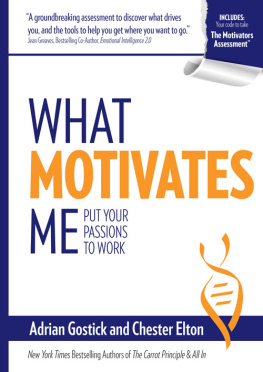A Carrot a DayA Daily Dose of Recognition for Your Employees
ADRIAN GOSTICK
CHESTER ELTON
with
GregBoswelland
ScottChristopher
Gibbs Smith, PublisherSalt Lake City
First Edition
08 07 06 05 04 10 9 8 7 6 5 4 3 2 1
Copyright 2004 O.C.Tanner Company
All rights reserved. No part of this book may be reproduced by any means whatsoever without written permission from the publisher, except brief portions quoted for purpose of review.
Published by
Gibbs Smith, Publisher
P.O. Box 667
Layton, Utah 84041
Orders: 1.800.748.5439
www.gibbs-smith.com
Designed by Gotham Design
Library of Congress Cataloging-in-Publication Data
Gostick, Adrian Robert.
A carrot a day: a daily dose of recognition for your employees/by Adrian Gostick and Chester Elton; with Greg Boswell and Scott Christopher1st ed.
p. cm.
ISBN: 1586855069
1. Incentive awardsUnited States. 2. Employee motivationUnited States. 3. Employee retentionUnited States. I. Elton, Chester. II. Title.
HF5549.5.I5G6923 2004
658.314dc22
2004008167
Dedication
This book is dedicated to the memory of Obert Clark Tanner, a man who dedicated his life to the study of appreciation. Obert never let a day pass without valuing those around him. You could say he was the first practitioner of the Carrot a Day philosophy.
About the Authors
Adrian Gostick and Chester Elton are the worlds leading authorities on employee motivation. They provide dynamic, humorous and powerful presentations on the power of recognition.
Find out more at carrotbooks.com.
Adrian Gostick is coauthor of the UPI International Bestseller The Integrity Advantage. An award-winning business author, Adrian also co-wrote the critically acclaimed business book The 24-Carrot Manager, called a must read for modern-day managers by Larry King of CNN. He has written for USA Today Magazine,Investors Business Daily and other national publications, and has been featured on CNBC, MSNBC and National Public Radio. Adrian is director of corporate communication with the O.C.Tanner Company, the worlds leading employee-recognition firm. He has a masters degree in strategic communication and leadership from Seton Hall University and is a guest lecturer on organizational culture at that university.
Chester Elton is coauthor of the best-selling Managing with Carrots, nominated as the Society for Human Resource Management (SHRM) Book of the Year. He is also coauthor of The 24-Carrot Manager. As a motivation expert, Chester has been interviewed by the Wall Street Journal and has been a guest on CNN, Bloomberg Television and on National Public Radio. A sought-after speaker and recognition consultant, Chester is vice president of performance recognition with the O.C.Tanner Recognition Company. He has been a featured speaker at the SHRM annual conference, HR Southwest, Incentive Magazine Forums, New York City Premium and Incentive Show, and Chicago Motivation Show. He serves as a recognition consultant to Fortune 100 firms.
ForewordEh, Whats Up, Doc?
Carrots are good for you, Billy. They help you see better. Everyones mother said that in an effort to get their children to eat more carrots.
And she was right. Carrots are good for you.
Fast forward thirty years, and carrots still play a major role in your healthor, should I say, your career health and your business health.
Now instead of encouraging you to eat carrots, theyre dangled for you to grasp. Dangled just out of reachjust enough to go for it! Or better, they are offered as a reward for a job well done.
Managers and employers are constantly looking for the secret of motivating their people. Therein lies the problem. You cant motivate peopleBUT you can set an example and create an environment where they will motivate themselves. And you can use Carrot Power to make this magic happen.
You can inspire them with carrots.
You can challenge them with carrots.
You can encourage them with carrots.
You can reward their efforts with carrots.
And you can celebrate their achievement with carrots.
As a leader, the secret to creating a successful work environment is to first create an atmosphere in which success can occur. This means a continuous positive attitude on your part, and continuous positive reinforcement for your employees. It means recognizing and rewarding great performance.
The tone for the company is set by creating the right work environment (and the right boss environment). Word of mouth is just as powerful from your employees as it is from your customers. If you treat your customers great and your employees lousy, that mixed message is devastating at the cash register.
So many leaders fail to realize that their employees go home and talk about their day with you, just like customers go home and talk about their purchases and experiences with you. And the internal customer is just as powerful as the external one. When you have a great, productive, high-earning team the word gets out. The law of attraction kicks in. Great talent will call and want to work for you. What a great dilemma to have.
What youre about to read are 365 ways to turn carrots into gold. Gold for recognition, gold for reward, gold for customer service, gold for internal customer service, gold for productivity, gold for morale, gold for employee retention, gold for customer retention, and gold for corporate profit.
Sure, an apple a day keeps the doctor away. But a carrot a day is positive reinforcement for tasks and projects being completed, customers being served. People are being recognized for a job well done, and happiness reigns supreme.
I challenge you to put Carrot Power to work for you and your company. The golden answers you seek to implement this program are within these pages, skillfully written by recognition experts Gostick and Elton. Read them. Study them. Implement them.
Jeffrey Gitomer, author of The Sales Bible and Customer Satisfaction is Worthless, Customer Loyalty is Priceless
Introduction
A few years ago, researchers with more funding than sense conducted a survey of 10,000 people.They asked whether the person on the other end of the phone knew how to ride a bike.
Remarkably, out of a sample the size of a major Iowa town, only three people couldnt ride. Thus, we can assume, its an experience weve all had.
How did we learn to ride our bikes? Whether we grew up in the suburbs, the urban jungle, or a real jungle, some trusted person (Mom or Dad for many of us) trudged out to the road with us. Terrified, we climbed on the bike, pedaled for a few unsteady feet, then fell off. But bless their hearts, those trusty companions didnt give up. They steadied us by holding the back of our seats. At great personal discomfort, they ran alongside. And they kept praising our efforts.
You got a little farther that time
Way to go, honey, youve almost got it.
Hey, I bet that wont even need stitches
In the end, all the praising and support finally bolstered our courage and we were ready to go it alone. Suddenly, we were riding. Without training wheels. Without anyones hand guiding us.
Thus, we earned the reward: we were able to ride anywhere on the block on our own.
Yes, we were free. We owned the road.
You didnt know it at the time, but you learned your first management lesson that day. Its a lesson that will make you a much more effective leader if you live it. The lesson is this: Great managers

